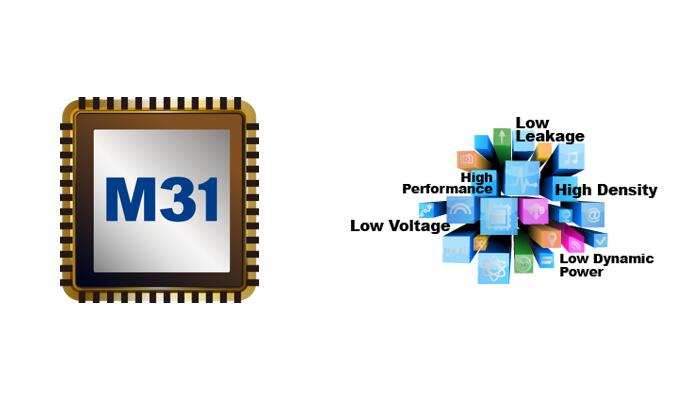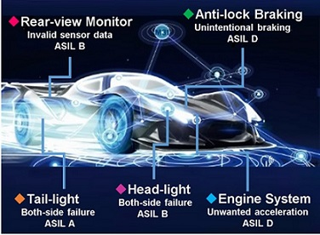Specialized in customization, SIP Boutique M31 Leads AI/IoT Innovation
Article By : Judith Cheng

An Interview with M31’s Chairman/CEO and Two Executive Vice Presidents
For SoC designers, when the semiconductor process moves toward 7nm and 5nm advanced nodes, the challenges they face are not only the increasing design complexity, but also the great risk brought by the growing process cost. Furthermore, although the design requirements vary from one application to another, every product is expected to have the shortest time to market in the age of IoT and AI. In this circumstance, SIP becomes more significant in the IC design process.
![Figure 1: A silicon carbide wafer [Source: STMicroelectronics.]](/wp-content/uploads/sites/2/2020/04/d774eb20-7436-451d-beab-8a466313265e.png)
With substantial experience in IC design/SIP area, H.P. Lin, the Chairman/CEO of M31 Technology, foresaw the above trends and the rising market demand for SIP. Thus in 2011, he founded M31 Technology, a focused IP provider and developer. He mentions that IC designers today can see the business opportunities brought by IoT and AI. Each company focuses on different applications, but they all pursue “speed” and want to realize their design idea in the shortest time. “Therefore, we observe that many customers, especially the start-ups focusing on AI/IoT design in North America and China, have a strong demand for SIP. They already have the system design concept and need various SIP to build up their solution. M31 is just their helpful partner to offer the most appropriate IP.”
H.P. Lin further points out “Two obvious characteristics of these customers during the cooperation. One is their high demand for IP ‘customization’. They hope to change standard IP specifications like voltage and layout. The other is their higher demand for SIP's ‘power, performance, area (PPA), and reliability levels’ because of the highly competitive market. They hope that SIP vendors will offer them the best choice.” It is on account of the latter that M31 specifically focuses on running a "boutique" IP business. M31 has more than 10 foundry partners (including TSMC), all of which provide process-proven high-quality Hard IP, guaranteeing the success rate of customers’ designs.

M31 invests a lot of manpower to satisfy customers’ demand for customization. H.P. Lin explains that “Providing IP customization service is a resource-consuming and exhausting task, but we believe that it is necessary. It can help customers to achieve product differentiation in the market to increase their competitiveness.” M31’s support of customization has become the advantage that differentiates it from other IP vendors. To make an analogy with the fashion industry, M31 identifies itself as a “Boutique” that only offers high-quality clothing and “tailors” to customers’ requirements.
Increase Product Competitiveness for Customers with Customized Design
Scott Chang, one of the two Executive Vice Presidents of M31, adds that in the past, chip designers could meet customers' needs by reusing standard IP. However, as IoT/AI-related applications have diversified, M31 observes that on the actual market there is huge demand not only for IP, but also for IP customization. Take High-Speed Interface IP as an example. Most AI designs require a high processing speed and a large data transmission to accomplish low-latency applications, such as dynamic image beautification. Interface IPs such as USB, PCIe, MIPI, SerDes, etc. are indispensable. "But customers may also demand low power consumption at the same time. In this case, simply offering reused standard IP is not satisfactory. It is necessary to re-design IP according to customers’ needs and then find the most appropriate compromise considering various conditions."
H.P. Lin states that, nowadays, during business negotiations, a large portion of customers will request customization in their search for IC design IP. "Besides High-Speed Interface IP, customization of Foundation IP is also in demand, including Standard Cell Library." He explains that in the previous era customers asked for such Foundation IP from foundries at first because Foundation IP is more related to the foundry process. However, now they will directly seek support from IP vendors like M31 since they want to modify the standard IP specifications for their differentiated designs. This change has brought new workload and new opportunities as well to IP corporations.
M31 regards its design capability in customized IP as one of its biggest competitive advantages. "Our engineering team in Taiwan is well-experienced in this area and can complete tasks with high efficiency." says H.P. Lin. He also emphasizes that to perform well in supporting customized IP, building a solid foundation of the original standard IP library is necessary. With high-quality IP and supply processes, M31 can achieve design differentiation for customers and shorten the product development process at the same time. "We are committed to providing satisfying services. From the ‘design case launch’ to the ‘IC tapeout,’ we work with customers ‘side by side’ throughout the whole process.”
Carefully Chosen IP, Partners, and Customers
One of M31’s goals is expanding its IP products to diversify options for customers. H.P. Lin says that M31’s new IP products are mainly categorized under Foundation IP and High-Speed Interface IP. For instance, I/O product lines such as ONFi and eMMC belong to Foundation IP. Display Port, HDMI, and analog IP like the LDO power management required by IoT low-power consumption design, are all High-Speed Interface products. "However, we have no intention to handle everything. We will focus on our specialized technology. In the embedded microprocessor area, such as controllers, CPU/GPU, DSP, etc., we cooperate with good partners, such as Andes, the popular IP supplier of RISC-V architecture processor.”
Willis Shih, one of the two Executive Vice Presidents of M31, states that there are three directions for the future development of M31’s products:
First, taking TSMC as a benchmark to follow the evolution of semiconductor processes. We have Foundation IP and Interface IP that have passed the mainstream 28nm, 22nm, 16nm, and 12nm process verification. We will keep advancing to the 7nm and 5nm nodes in the next year.
Second, considering market applications. Aside from IoT and AI application IP, M31 also got into the automotive market with automotive IP in 2019. Many IP products have received ISO 26262 Safety Certifications and then been adopted by first-tier U.S. and European customers.

Third, continuing to expand IP product lines, such as ONFi I/O mentioned above. Besides, M31 is ready with Foundation IP of special processes, such as BCD (Bipolar/CMOS/DMOS) process required for power management chips, HV (High Voltage) for display driving IC applications, and the embedded memory system process required for MCU design. Scott Chang adds that there is also a popular trend of IP, but it doesn’t mean that older IP is less important. Therefore, M31 will keep paying attention to both the popular IP in the market and the previously existing IP in various designs.
M31 pursues quality instead of quantity in terms of IP as well as in terms of customers. Scott Chang says that M31 is a small company for the moment. In order not to waste precious resources, M31’s strategy has always been "Do the best, or nothing." Therefore, to realize its maximum value, M31 will consider customers’ designs regarding development potential, avoiding “Me too" products that compete on price. “IP is an industry that takes time to cultivate and requires solid basic skills to win customers’ trust. We hope to develop ‘small but perfect’ products and make customers successful as a hidden champion behind their back."
Catering to Global Market from Taiwan
So far M31 has only around 200 employees with its headquarters in Hsinchu, but its market is worldwide in scope covering European/American/Asian countries. As H.P. Lin says, “M31 was established to provide IP for customers around the world. Its first subsidiary was founded in the U.S. due to the country’s leading position in the high-tech industry. At first, we worry about issues involving language barriers and technical support. Fortunately, after years of intensive communication and offering customized services, we have been recognized by the first-tier corporations in the U.S. in areas like automotive and communication.”
“The Asian market is our strength. The IP we provide is closely related to foundry processes, and Taiwan happens to have an excellent geographical position near foundry partners. Whether it is the market of Taiwan, China, Japan, Korea, or Southeast Asia, we can immediately respond to technological changes in processes and then support customers without delay." As H.P. Lin points out, M31 pays close attention to the connection between its regional local teams and its Taiwan headquarters to ensure that all personnel have the latest technical information. He emphasizes again that "we are looking at the world. As long as there are Fabless companies, they will be our target market."
Subscribe to Newsletter
Test Qr code text s ss


